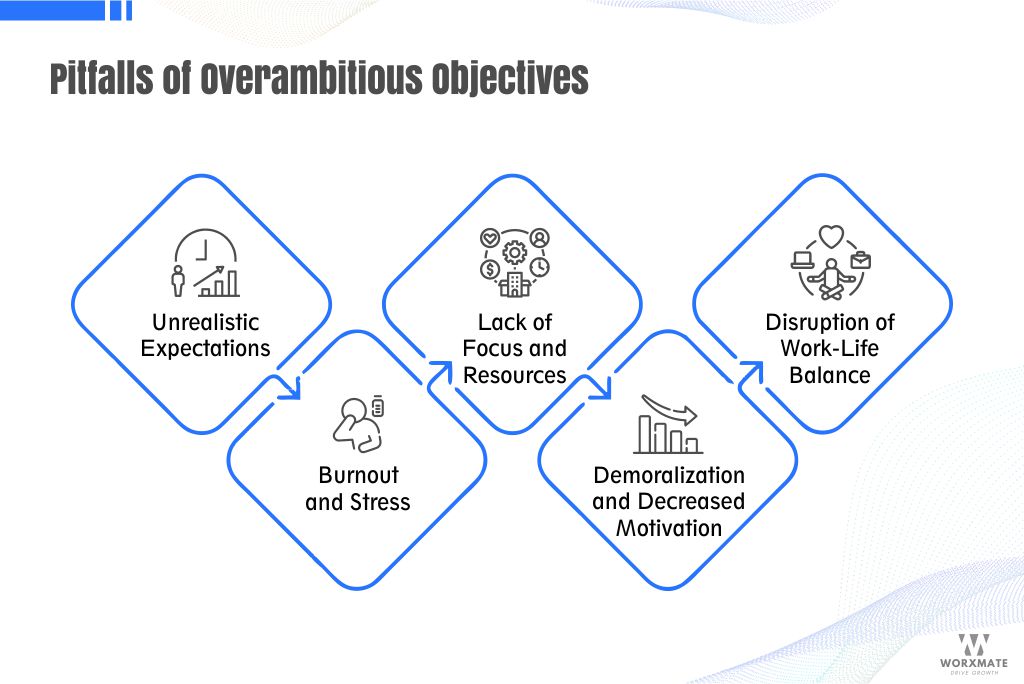Setting goals is integral to personal and professional development. However, there’s a fine line between ambition and overambition, and failing to recognize this distinction can lead to many detrimental outcomes.
-
Unrealistic Expectations
One of the most common pitfalls of overambitious objectives is the tendency to set goals beyond one’s capabilities. While it’s natural to aspire to greatness, setting unrealistic expectations can set us up for failure. Whether aiming for rapid career advancement, achieving overnight success in a new venture, or setting unattainable performance targets, overambitious objectives often lead to disappointment and frustration.
Constantly falling short of lofty goals can affect our self-esteem and confidence, leading to a cycle of self-doubt and diminished motivation. Moreover, the psychological impact of repeated failure can be significant, causing stress, anxiety, and even depression in some cases. It’s essential to recognize our limitations and set challenging yet attainable goals, allowing for growth and progress without setting ourselves up for failure.
-
Burnout and Stress
Another significant consequence of overambition is burnout. The relentless pursuit of ambitious goals can push us to our physical and mental limits, leading to exhaustion and burnout. Whether working long hours, sacrificing leisure time, or neglecting self-care, overambition can affect our well-being and overall quality of life.
Stress levels skyrocket when we constantly strive to meet unrealistic expectations, leading to negative outcomes, including decreased productivity, impaired decision-making, and strained relationships. It’s essential to prioritize self-care and maintain a healthy work-life balance to prevent burnout and ensure long-term success. -
Lack of Focus and Resources
Pursuing too many objectives is a common pitfall of overambitious goal-setting. While it’s tempting to chase multiple opportunities to maximize success, spreading ourselves too thinly can have the opposite effect. Without clear focus and direction, resources become diluted, and progress stagnates.
Juggling multiple objectives can lead to confusion, overwhelm, and, ultimately, a lack of meaningful progress. It’s crucial to prioritize our goals and allocate resources accordingly, focusing on the most impactful initiatives while setting aside less critical pursuits. By concentrating our efforts and resources on a few objectives, we can achieve greater efficiency and effectiveness in our pursuits.
-
Demoralization and Decreased Motivation
Repeated failure to meet overambitious goals can have a demoralizing effect, sapping our motivation and enthusiasm for future endeavors. Whether it’s a series of setbacks in our personal or professional lives, each disappointment chips away at our confidence and belief in our abilities.
As motivation wanes, so does our willingness to take risks and pursue new opportunities. Over time, this can lead to complacency and stagnation as we settle for mediocrity rather than striving for excellence. It’s essential to acknowledge our failures as learning opportunities and maintain a positive outlook, even in adversity. By focusing on progress rather than perfection, we can reignite our motivation and pursue our goals with renewed vigor.
-
Disruption of Work-Life Balance
One of the most significant consequences of overambition is the disruption of work-life balance. When our pursuit of success consumes us, other areas of our lives often suffer as a result. Whether it’s neglecting our health, sacrificing time with loved ones, or neglecting hobbies and interests, overambition can affect our overall well-being.
A healthy work-life balance is paramount for long-term success and happiness. It’s crucial to carve out time for relaxation, recreation, and meaningful connections outside of work, allowing us to recharge and rejuvenate physically and mentally. By prioritizing self-care and setting boundaries, we can prevent burnout and achieve sustainable success in all areas of our lives.

Alternatives to Overambition
So, what’s the alternative to overambition? Rather than chasing unrealistic goals, setting realistic, achievable objectives that align with our capabilities and values is essential. Rather than fixating on the result, focus on the journey and the progress you make.
Incremental progress is key to long-term success, so celebrate small victories and milestones. By breaking larger goals into smaller tasks, you can maintain momentum and stay motivated even when faced with challenges.
Course Correction
Recognizing that you’ve fallen into the trap of overambition is the first step towards reclaiming balance and steering your journey toward success. Here are some strategies to help you course correct and adopt a more realistic and sustainable approach to goal-setting:
-
Reassess Your Objectives
Take a step back and critically evaluate your current objectives. Are they truly aligned with your values, priorities, and capabilities? Are they realistic and achievable within the given timeframe? Be honest with yourself and identify any objectives that may be overly ambitious or unrealistic.
-
Prioritize What Truly Matters
In the hustle and bustle of chasing after goals, it’s easy to lose sight of what truly matters to you. Take the time to reflect on your values, passions, and long-term aspirations. What goals align most closely with your core values and bring you the greatest sense of fulfillment? Prioritize these goals and let go of any objectives that don’t serve your overarching vision for your life.
-
Align Goals with Core Values
When your goals are harmonious with your values, you’ll feel more motivated and fulfilled in pursuing them. Consider whether your current objectives reflect your deepest desires and aspirations, and adjust them accordingly to better align with your values.
-
Be Willing to Adapt and Adjust
Flexibility is key to navigating the ups and downs. Be open to adapting and adjusting your goals as needed based on changing circumstances, feedback, and new insights. If you encounter unexpected obstacles or setbacks, don’t be afraid to pivot and revise your approach. Remember, it’s not about sticking to a rigid plan, but rather about staying adaptable and responsive to the evolving realities of your journey.
-
Seek Support
Don’t be afraid to seek support from trusted friends, family members, mentors, or colleagues. Share your goals and aspirations with others who can offer encouragement, guidance, and accountability along the way. Having a support system can help keep you motivated, focused, and on track towards achieving your objectives.
OKRs: Harnessing Ambition with Accountability for Organizational Success
OKRs offer a structured framework that can help mitigate the pitfalls of overambitious objectives by promoting clarity, alignment, and focus:
- Focus on Measurable Results: OKRs emphasize setting specific and measurable key results that are challenging yet achievable. This helps avoid the trap of setting overly ambitious objectives by providing a clear benchmark for success.
- Encourage Regular Check-ins: OKRs typically involve regular check-ins to assess progress and make any necessary adjustments. This ongoing feedback loop allows teams to course-correct if objectives are too ambitious or if priorities shift.
- Promote Alignment: OKRs encourage alignment between individual, team, and organizational goals. By cascading objectives throughout the organization, everyone can see how their work contributes to the broader mission, reducing the risk of pursuing objectives that are disconnected from the organization’s overall strategy.
- Emphasize Learning and Adaptation: OKRs foster a culture of learning and adaptation by encouraging experimentation and innovation. If ambitious objectives aren’t fully achieved, teams can still learn valuable lessons that inform future goal-setting processes.
- Balance Ambition with Realism: OKRs encourage setting stretch goals that push teams beyond their comfort zones while still being grounded in reality. This helps strike a balance between ambition and achievability, minimizing the risk of burnout and disappointment.
Note: While overambitious objectives can lead to various pitfalls within an organization, adopting the OKR framework can help mitigate these risks by promoting clarity, alignment, and a balanced approach to goal-setting.
Conclusion
The pitfalls of overambitious objectives are numerous and far-reaching, from stress and burnout to diminished motivation and disrupted work-life balance. By recognizing the dangers of overambition and adopting a more balanced approach to goal-setting, we can achieve greater success and happiness in all areas of our lives.
Remember to set realistic, achievable goals, prioritize self-care and work-life balance, and celebrate the journey rather than fixating on the destination.




